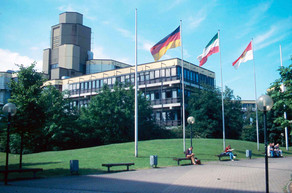Proton therapy background
Proton therapy is a special radiation therapy procedure in which a tumor is irradiated with high-energy protons - instead of photons as in conventional radiation. From an accelerator, the particles are precisely directed at the tumor tissue as a focused beam at up to 60 percent the speed of light. When the beam enters the human body, protons are slowed down in such a way that the particles release most of their energy directly in the tumor, thereby damaging the tumor cells. The advantage of hadron or proton therapy is that a very high dose of radiation can be deposited in the tumor, while the surrounding tissue - especially organs at risk - is spared. Special physical procedures allow the tumor to be irradiated very precisely along its individual shape.
Proton therapy becomes new focus at TU Dortmund University
Medical Physics at the Department of Physics at TU Dortmund University has expanded its research into the physical principles and applications in proton therapy. Already in January 2020, the new interdisciplinary graduate college „Precision Proton Therapy” has started. The aim is to introduce doctoral students to proton therapy. They are to conduct research on topics of the complex process chain - from imaging to irradiation - and thus improve clinical application. The graduate college is carried out through a collaboration between the Department of Physics at TU Dortmund University, the Clinic for Particle Therapy at the West German Proton Therapy Center Essen (WPE) of the University Medical Center Essen, the Medical Faculty of the University of Duisburg-Essen and Technical Chemistry I (TC1) as well as the Center for Nanointegration Duisburg-Essen (CENIDE). The research training group is funded by the Mercator Research Center Ruhr (MERCUR).
Since mid-March 2020, the Medical Physics and Radiotherapy group led by JProf. Dr. Armin Lühr has strengthened the Physics faculty. The group focuses on the optimization of proton therapy using Monte Carlo simulations, applied atomic and nuclear physics, radiobiology and statistical methods.



![[Translate to English:] Studierende, Gespräch, Fenster Students are talking in front of a large window](/storages/zentraler_bilderpool/_processed_/7/3/csm_Fensterfront-Gesprache-2_5ccc16e30c.jpg)




